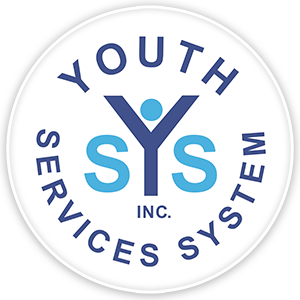Parenting Services & Visitation
Youth Services System credentialed staff provide parenting instruction using evidence-based programs like Nurturing Parenting and Systematic Training for Effective Parenting (STEP). Supervised visitation is available in comfortable family-friendly centers and the comfort of your home.
Availability:
- Information/Referral services are available 24 hours daily by calling 1-800-YSS(977)-8918
- Assessment/evaluation and therapy/counseling services are available Monday – Friday between 9am-5pm
- Safety services, supervised visitation, parenting instruction and life skill training are available during business hours as well as evenings and weekends with advance scheduling
Services Outcome:
- Children and families will experience improved relationships and problem-solving
- Improved mental health and daily functioning
- No further legal or child-welfare issues
- Improved parental confidence and functioning
- Improved school and employment attendance and performance
Services provided include*:
- Family & Needs Assessment/Service Plan
- Case Management
- Emergency Respite
- Safety Services
- Supervised Visitation
- Connection Visit
- Pre-Reunification Support
- MDT Attendance
- Agency Transportation
- General & Individualized Parenting
- Adult Life Skills
*As defined by Acentra Health
Family & Needs Assessments/Service Plan:
- In-home face-to-face interview to evaluate family needs. Identification of short and/or long-term services the family needs is completed to establish a short-term case plan.
- The purpose of the family assessment is to gather information regarding the family dynamics to determine the strengths and needs around the following areas: family, residential, social, educational/vocational, health, mental health, recreational, spiritual, legal, and financial.
Case Management:
- Case Management services assist recipients to gain access to needed medical, behavioral health, social, educational, and other services. These components include service planning, linkage/referral, advocacy, family crisis response planning, and service plan evaluation.
Emergency Respite:
- Unplanned break for primary caretakers who are in challenging situations in which a trained provider, friend, or family member assumes caregiving and supervision of a child(ren) for a brief period of time. Service may be provided in or out of the natural home or on an hourly/daily basis. Temporary relief from parenting responsibilities is provided to avoid abuse, neglect, abandonment situation, or placement disruption.
Safety Services:
A grouping of services for families to assist in assuring safety for children by controlling impending dangers:
- Supervision - "Eyes on" oversight of the child or family which provides an active, ongoing assessment of stressors that affect safety and may result in necessary actions.
- Parenting Assistance - Direct face-to-face service to assist caregivers in performing basic parental duties or responsibilities which caregiver has been unable or unwilling to perform. Basic parental duties and responsibilities include such activities as feeding, bathing, basic medical care, basic social/emotional attention and supervision.
- Family Crisis Response - Family crisis response is a face-to-face intervention in the consumer's natural environment to assess and de-escalate a family crisis that affects child safety.
- Social / Emotional Support - Provision of basic social connections and basic emotional support to caregivers.
- Crisis Home Management - Service to provide assistance with general housekeeping/homemaking tasks caregivers must do in order to provide a safe environment for their child. Examples include meal preparation, grocery shopping, budgeting or cleaning, and maintaining a physically safe residence.
Supervised Family Time:
"Eyes on" oversight is required to provide structure and ensure the performance of developmentally appropriate activities necessary to carry out activities of daily living and to ensure safety for the identified client, family, and/or community.
- Supervised Family Time One: Service in which visitation between family members (parent to child or child to child) is observed. Ensures general safety and appropriate interaction is maintained during visitation. The observer/assessor either looks in on visits between family members periodically (as determined by the DHHR situation plan) or observes the visit while sitting in the room with family members.
- Supervised Family Time Two: Service in which visitation between family members (parent to child or child to child) is observed to evaluate appropriateness and level of interaction. The observer/assessor will intervene if abuse or inappropriate behavior is occurring. The purpose is to assess and monitor the appropriateness of family reunification.
Connection Visit:
- Face-to-face visits for the purpose of preserving the connections between children/youth who are in the custody of the DHHR and living in a foster family home, group home, or who are college students living on campus with their siblings, relatives, or former foster parents.
Pre-Reunification Support:
- This service is for children who are still placed in foster care settings but are beginning transitional overnight visits to the home from which they were removed. The purpose is to observe the interactions of the family as they adjust to being re-united in their own home and report to the DHHR worker and/or court regarding the family dynamics and give recommendations regarding the children being reunified.
MDT Attendance:
- Participation in a Multi-Disciplinary Team Meeting in person to present written reports of progress, answer questions, and assist in establishing the appropriate plan for the identified child and/or family.
Agency Transportation:
- Transportation that is needed to comply with the services for the purpose of attending a supervised visitation or medical visits outlined on the child/family’s service plan. Examples include therapy appointments (in which non-emergency medical transportation could not be accessed), respite, and recreational activities.
General & Individualized Parenting:
- General Parenting: Direct face-to-face educational services to improve parental performance and knowledge of basic child/adolescent care skills, nurturing, discipline strategies, appropriate supervision, encouragement of child/adolescent care, age-appropriate development, and realistic expectations and standards of child/adolescent behavior.
- Individualized Parenting: Same as General Parenting, with the addition of the STEP Parenting Curriculum (Systematic Training for Effective Parenting) as our main resource, as well as the Nurturing Parenting program.
Adult Skill Building:
- Direct service in which the identified parent, as part of the reunification plan, is assisted to develop basic home management skills and in developing social/emotional support networks through hands-on implementation and role modeling. Possible activities include housekeeping, cleaning, food shopping, meal preparation, laundry, budgeting, utilizing community resources, accessing medical and school records, and personal care/hygiene.

 Download our free app today to receive real-time alerts, catch up on news, view upcoming events and track important dates.
Download our free app today to receive real-time alerts, catch up on news, view upcoming events and track important dates.